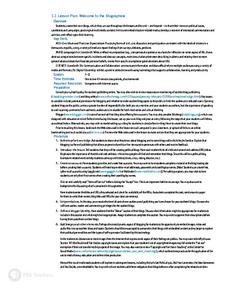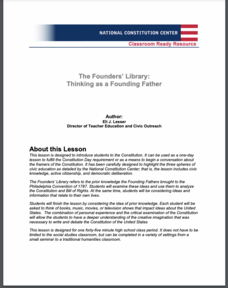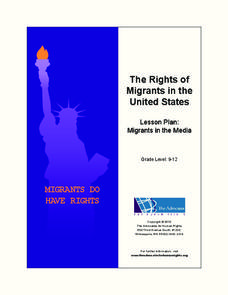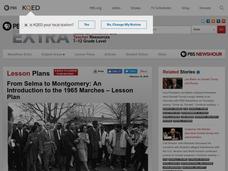Curated OER
Technology Blackout Day
Students describe the impact of modern technology inventions on daily life. They create a graph of the class's favorite item of technology and draw a picture of their favorite piece of modern technology.
Curated OER
The Great Depression
Students are be able to analyze primary sources (photographs and letters) for evidence of difficulties children faced during the Great Depression. They are asked how the government tries to help people with problems that people face to...
Curated OER
The Pan-American Exposition of 1901
Students examine the impact of the 1901 World's Fair. In this activity on invention and politics, students watch a video then conduct Internet research in order to learn about the Pan American Exposition. Students will create a brochure...
Curated OER
Intermediate Level Lesson Plan THEMATIC ESSAY
Students identify three reasons why conflict arose in the Western United States during the late 1800s. Using specific examples, discuss how the United States government attempted to resolve these conflicts. Evaluate whether these...
Curated OER
The Holocaust
Tenth graders reflect on the effects of the Holocaust and the events leading up to World War II. In this World History lesson, 10th graders complete several activities, including a WebQuest, that analyze the Holocaust and its...
Curated OER
Dr. Fix-It Subjects: Health, Government
Help your high schoolers undertand the critical problems around healthcare. By focusing on the political and private process of healthcare, students will watch a video, analyze issues, and write an essay on their findings. Additionally,...
Curated OER
Welcome to the Blogosphere
Create a blog spot for your classroom and promote online discussions. There are several blogging websites listed here, and you can create one specific to each class or one collective site. Teach your learners how to post on the blog, and...
Carolina K-12
Preventing Voter Fraud or Encouraging Voter Suppression?
The issues of voter fraud and voter suppression are relevant in every election, local as well as national. Soon-to-be voters learn about a recent bill proposed in North Carolina, the Voter Information and Verification Act, and...
Curated OER
Mapping the Mediasphere
Students compare/contrast the media messages they see in two different communities in their city. They list the elements of art and the principles of design in the photographs they have taken in those two different communities. They...
Curated OER
US Constitution
Think about the Bill of Rights and the Declaration of Independence with your budding historians. They analyze the importance of historical documents by examining several famous documents, and then they complete activities that check...
Delegation of the European Union to the United States
Cultural Identity
How does cultural diversity impact political identity? That is the question researchers face as they continue their examination of the European Union and the programs it has developed in its attempt to achieve unity in diversity. To gain...
NPR
Civil Rights of Japanese-American Internees
Prompted by a viewing of Emiko and Chizu Omori’s Rabbit in the Moon, a documentary about the internment of Japanese-Americans during World War II, high schoolers examine a series of documents, including the Bill of Rights and the UN’s...
UNICEF
Get Real on Climate
Climate change isn't just about a warming planet; it will affect humans' health, spread of disease, changes in heat waves and droughts, and changes in storms and wildfires. Participants explore global climate change through discussions...
Curated OER
Statehouse Time Capsule
Fourth graders create a time capsule that is representative of their community. They explain why the chosen objects are representative of themselves or their community.
Curated OER
Patriotic Symbols of the United States
Young historians take a close look at the most famous patriotic symbols of the United States and determine what they actually stand for. Symbols such as Uncle Sam, The Statue of Liberty, The Bald Eagle, and The Liberty Bell are studied....
Curated OER
Manners and Mores of Washington's America
Learners explore the social policies of early America. In this etiquette lesson, students read George Washington's "110 Rules of Civility and Decent Behavior in Company and Conversation." Learners identify expectations for their own...
Curated OER
Public Officials, DUI And Role Models
Students research on Internet and in any available law books to find drunk driving laws in their state, including ramifications of refusing breathalyzer or other tests, identify rights of someone arrested and charged with DUI-related...
Center for Civic Education
Orb and Effy Learn About Authority
Simplify the teaching of the US Constitution with this primary grade social studies lesson. While reading a fun story about an imaginary place called Bubble Land, children learn about the concept of authority and the importance of...
Center for Civic Education
What Basic Ideas About Government Are Included in the Preamble to the Constitution?
Young historians explore the meaning of the Preamble to the US Constitution in this upper-elementary social studies lesson. Working with partners or in small groups, children discuss the purpose of government before reading and analyzing...
Curated OER
What is the Federal System Created by the Constitution?
Explore the unique structure of the federal system of government in the United States. Class members will learn about how most nations were organized before the establishment of the Constitution, how power is currently divided...
Curated OER
What is Meant by Returning to Fundamental Principles?
What did the Founding Fathers mean by the importance of continually returning to fundamental principles? Your young historians will analyze a series of quotations illustrating the fundamental ideals and principles of the...
Curated OER
The Founders’ Library: Thinking as a Founding Father
Students analyze the U.S. Constitution and the Bill of Rights. In this U.S. government lesson, students examine books, movies, and music that influence them today and then investigate writings that influenced the framers of the...
Advocates for Human Rights
Migrants in the Media
Class members examine two documents—The Universal Declaration of Human Rights and The Rights of Migrants in the United States—and then use reports in the media to assess how well the US is doing in ensuring these rights.
PBS
From Selma to Montgomery: An Introduction to the 1965 Marches
The 1965 Civil Rights marches from Selma to Montgomery and the resulting Voting Rights Act of 1965 are the focus of a social studies lesson. The resource uses film clips to inform viewers not only about the discrimination that gave rise...























